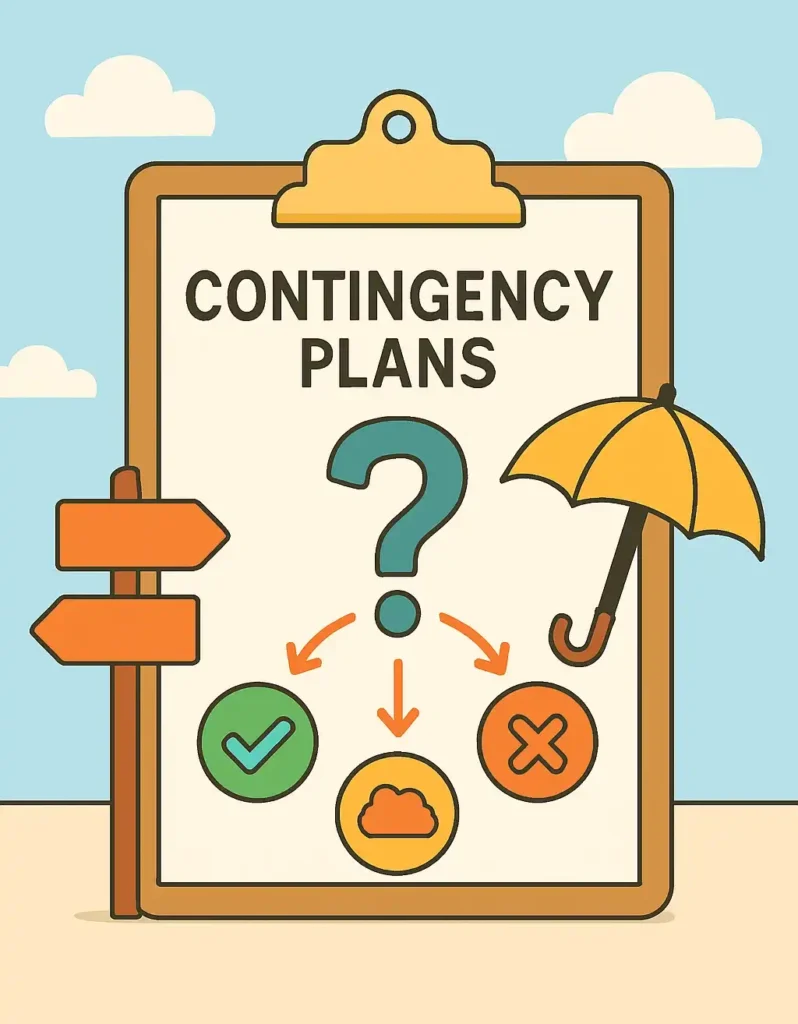The popular saying “failing to plan is planning to fail,” attributed to Benjamin Franklin, is frequently ignored or underestimated despite its enduring relevance today.
Failing to plan is planning to fail empowers goal setting, enhances time management, and promotes informed decision-making.
Whether we are pursuing personal or professional goals, taking the time to plan and prepare is a crucial step towards achievements.
Key Insights:
- Planning empowers goal-setting, time management, and decision-making.
- Establishes purpose, direction, and control, reducing failure risks.
- Enables resource optimization and avoids regrets for achieving set objectives.
- Fosters motivation, focus, and adaptability through effective planning.
- Strategies like contingency plans and resource prioritization aid in overcoming challenges.
Failing to plan is planning to fail

Failing to plan is planning to fail emphasizes the importance of proper planning to create a sense of purpose, direction, and control. The phrase also indicates that not having a plan increases the chances of failure.
Planning enables us to optimize our time and resources while helping us achieve our objectives and aims.
Planning is essential for success, or else failure to plan is planning to fail.
Planning effectively lets us remain motivated, focused, and on course, even in the face of obstacles or setbacks.
By overlooking this step, we risk losing sight of our goals and failing to make the progress we desire.
We frequently find ourselves squandering time and money on activities that are not in line with our objectives.
Alternatively, if you fail to plan you plan to fail. Regret and despair may arise from this.
Yet, despite the importance of planning, many individuals and businesses still fail to do so effectively.
Another reason for failing to plan is overconfidence or complacency, thereby underestimating the importance of planning.

Significance of planning
Planning is significant for several reasons. Some of them are discussed below:
Goal setting:
Setting and working towards goals is made easier.
A strategic plan offers clarity of purpose and act as a guiding light to achieve long-term goals.
When we know exactly what we want to do, we can draw a plan to direct us in that direction.
Planning assists in honing and refining the objectives.
Without planning, we may lack direction and focus, leading to a lack of progress and feelings of stagnation.
We don’t get lost in all the details.
Proper information and inspiration help in deciding objectives.
You only fail when you stop trying.
You modify your missions based on this updated information.
Planning also aids in lowering overwhelming emotions and fosters a sense of control and success by breaking down larger goals into smaller, manageable actions.
Time management:

Planning helps us manage our time effectively.
We can prioritize our tasks and set aside time to finish them by making a schedule or to-do list.
This helps us avoid procrastination and ensures that we use our time wisely.
Time management skills are crucial in both personal and professional situations.
People may achieve more in less time with effective time management, which also relieves stress and anxiety and improves overall job satisfaction.
Planning helps us manage our time effectively.
We can arrange our tasks and set aside time to finish them by making a schedule or to-do list.
Decision making:

Planning allows us to make better decisions. This phase of the planning process is significant.
When we have a plan in place, we can consider the consequences of our actions and make more informed decisions that align with our goals and values.
Engaging in critical thinking about the weaknesses of your plan enables you to make necessary adjustments.
Being mindful of the challenges and potential issues enables you to make informed and sound decisions at every stage of the planning process.
However, decision-making can be challenging, especially in complex and uncertain situations.
It demands tenacity, execution, and a willingness to learn from successes and failures.
Reduced stress:
When we have a plan in place, we know what to expect and can feel more in control of our lives.
Therefore, by reducing uncertainty, promoting focus, and enhancing control and balance, planning promotes well-being.
It also helps to avoid last-minute rushes and prevents burnout. This may help us not feel as overwhelmed and more assured in our capacity to deal with difficulties.
However, just like any other practice, planning is not without hurdles.
Challenges in planning

Planning is a valuable tool for achieving success, but it can come with challenges.
Some of the common hurdles in planning include:
Perfectionism:
Recognizing trap of perfectionism is crucial for timely progress.
The pursuit of flawless plans can create a cycle of procrastination.
Devise practical plans to shape your efforts. Accomplish smaller tasks and build momentum.
Uncertainty:
The future is inherently uncertain, making planning challenging.
Future developments, market shifts, or unforeseen difficulties can be challenging to predict.
Lack of information:
Planning requires information, and if we don’t have access to accurate or complete information, it can be tough to create a meaningful plan.
Analysis paralysis:
Sometimes, we can get so caught up in analyzing and planning that we fail to act.
This may result in apathy and a lack of progress.
Procrastination:

When you put things off, it blurs the clarity of purpose.
The roadmap to success remains elusive.
Time pressure causes rushed scheming and oversights.
Delaying plans limits improvement and adaptation, hindering plan effectiveness.
Overconfidence:
While mapping out is pertinent, it’s important not to be overconfident.
Maintaining flexibility, adaptability, and a willingness to alter as required.
Resource constraints:
Planning requires resources, including time, money, and personnel.
Creating and implementing a strategy effectively without these resources could be daunting.
Information Overload:
The abundance of data can overwhelm planners.
Excess information obstructs filtering and focusing on organizing.
The risk of uninformed decisions or missing critical elements rises.
Despite these challenges, planning is still an incredible tool for achieving success.
We may make effective plots to support us in achieving our objectives by being aware of the potential difficulties and taking action to address them.
You may also like:
Not Everyone Has the Same Heart as You: Embracing Diversity
Shoonya Meditation: A Step-by-Step Guide
How to overcome challenges in planning
Overcoming challenges in planning requires a combination of creativity, flexibility, and a willingness to adapt.
Here are some strategies that can help:
Develop contingency plans:

To address uncertainty, it can be helpful to develop contingency plans that outline possible scenarios and approaches for tackling them.
This might help in your readiness for unforeseen difficulties.
Failure to plan is planning to fail if there is no backup option.
Obtain as much information as possible:
It’s critical to compile as much data as possible to address a lack of information.
This can involve conducting research, consulting with experts, and seeking stakeholder input.
Select suitable planning approach:
Planning is not one-size-fits-all.
Find what resonates with you through different methods:
- Mind mapping: Organize thoughts and ideas visually with diagrams and branches. This method is ideal for brainstorming and gaining a broader perspective.
- Bullet journaling: Design a custom tracker for tasks, appointments, and reflections. Users can customize Bullet journaling to suit their needs.
- Pomodoro Technique: Break work into intervals for better focus and productivity.
- Project management tools: Use project management software such as Asana or Trello for complex projects.
Set deadlines:
To avoid analysis paralysis, set deadlines for completing various aspects of the planning process.
This can help you stay on track and ensure you’re getting closer to your goals.
Stay flexible:
To avoid overconfidence, remaining flexible and versatile is important.
This can involve being open to feedback, revising your plans as necessary, and being willing to pivot if circumstances change.
This ensures that your plan remains relevant and achievable.
Prioritize resources:
To address resource constraints, it’s important to prioritize the resources most important to your plan’s success.
Allocate resources effectively and focus on the most important aspects of your blueprint.
This can entail reallocating assets from other areas or seeking additional funding or support.
By being proactive and taking these steps, you can beat adversities and craft productive tactics for reaching your aims.
Conclusion
Effective planning is a linchpin for success in navigating personal or professional realms.
The significance of planning lies in its ability to streamline goals, optimize resources, and reduce stress.
It enables us to order our tasks, manage our time effectively, and make more informed decisions that align with our values and aspirations.
Self-efficacy is boosted as we get close to achieve our goals.
While occasionally we may luck out, we know that we could have achieved more with consistent planning and dedicated efforts.
However, problems like perfectionism, uncertainty, and resource constraints demand proactive strategies.
Developing contingency plans, obtaining information, and adopting flexible approaches help confront hurdles.
Mind mapping or bullet journaling help you design better in a flexible world.
The scheming journey requires continuous learning and grit.
Therefore, failing to plan is planning to fail; as Benjamin Franklin’s quote suggests, acknowledging challenges and planning leads to success.
Share your experience, tips, and success stories in the comments below.
Failing to plan is planning to fail related quotes
“A goal without a plan is just a wish.”
– Antoine de Saint-Exupéry
“The time to repair the roof is when the sun is shining.”
– John F. Kennedy
“Good fortune is what happens when opportunity meets with planning.”
– Thomas Edison
“Plans are nothing; planning is everything.”
– Dwight D. Eisenhower
“If you fail to plan, you are planning to fail.”
– Winston S. Churchill
“Planning is bringing the future into the present so that you can do something about it now.”
– Alan Lakein
“Plans are like a map. When you set out on a journey, you need a map to guide you to your destination.”
– Lailah Gifty Akita
“Plan your work and work your plan.”
– Napoleon Hill
“Planning is essential, and I have never been able to improvise.”
– Charlie Chaplin
“The more you plan, the luckier you get.”
– Gary Player
“It takes as much energy to wish as it does to plan.”
– Eleanor Roosevelt
“The wise man bridges the gap by laying out the path by means of which he can get from where he is to where he wants to go.”
– J.P. Morgan
Very informative guidance sir
My sincere appreciation